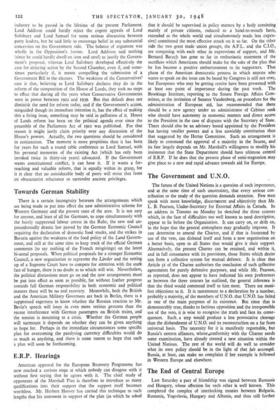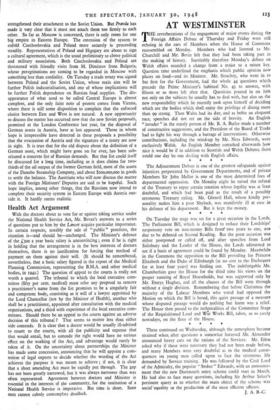The End of Central Europe
Last Saturday a pact of friendship was signed between Rumania and Hungary, whose affection for each other is well known. This completed the complex of interlocking treaties between Bulgaria, Rumania, Yugoslavia, Hungary and Albania, and thus still further
strengthened their attachment to the Soviet Union. But Pravda has made it very clear that it must not attach them too firmly to each other. So far as Moscow is concerned, there is only room for one big 'empire in Eastern Europe. The extension of the system to enfold Czechoslovakia and Poland more securely is proceeding steadily. Representatives of Poland and Htingary are about to sign a cultural agreement, which is the usual preliminary to closer political and military association. Both Czechoslovakia and Poland are threatened with friendly visits from M. Dimitrov from Bulgaria, whose peregrinations are coming to be regarded in Moscow with something less than cordiality. On Tuesday a trade treaty was signed between Poland and the Soviet Union, whose main aim will be further Polish industrialisation, and one of whose implications will be further Polish dependence on Russian food supplies. The dis- appearance of what used to be called Central Europe is almost complete, and the only faint note of protest comes from Vienna, where there is still some disposition to complain that the enforced choice between East and West is not natural. A new opportunity to discuss the matter has occurred now that the new Soviet proposals, promised at the London Conference last year, for the disposal of German assets in Austria, have at last appeared. Those in whom hope is irrepressible have detected in these proposals a possibility that the evacuation of Austria and the signature of a treaty are now in sight. It is true that for the old dispute about the definition of a German asset, which might have gone on for ever, has been sub- stituted a concrete list of Russian demands. But that list could itself be discussed for a long time, including as it does claims for two- thirds of the oil output of the former German field, most of the assets of the Danube Steamship Company, and about $zoo,000,000 in goods to settle the balance. The Austrians who will now discuss the matter with the Foreign Ministers' Deputies are said to be hopeful. Such hope implies, among other things, that the Russians now intend to complete their security system in Eastern Europe with Austria out- side it. It hardly seems realistic.



































 Previous page
Previous page